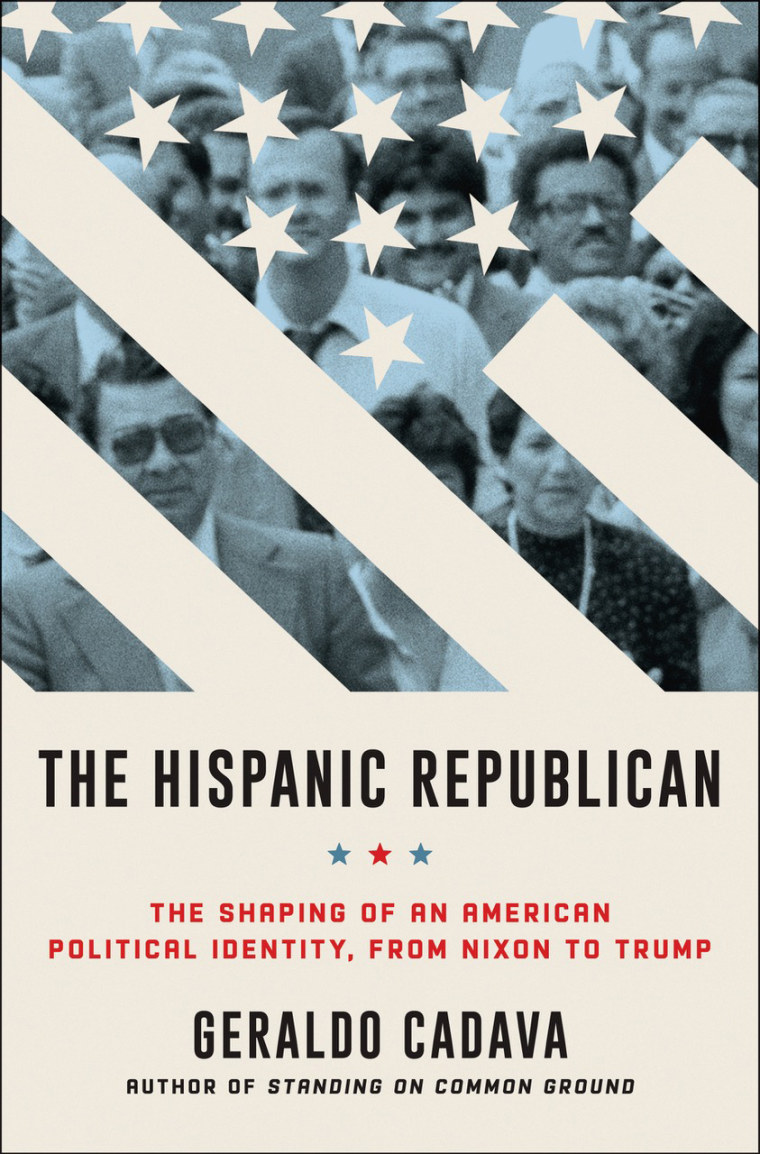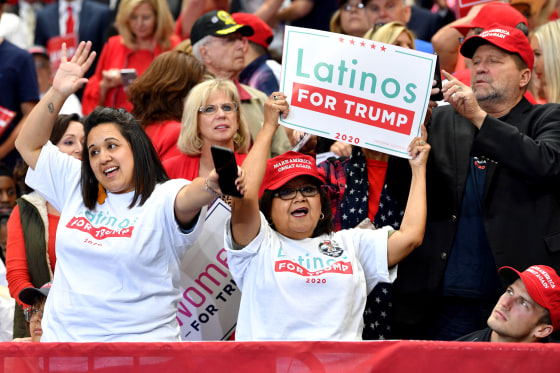During the 1970s and the 1980s, virtually every adult in America was walking around with the autograph of a Latina in their wallets or purses.
That's because there were three Mexican American women — all Republican appointees — who served as treasurer of the United States during those decades. While these Latinas were not household names, their signatures were on U.S. currency. Romana Acosta Bañuelos, Katherine Ortega and Catalina Vásquez Villalpando were, in a sense, present in every business and household in the country.
What's more, the first Latino to run as a major-party candidate for president (in 1980) was a Republican, Benjamin Fernandez, co-founder of the Republican National Hispanic Assembly.
It is this largely unknown history that Geraldo L. Cadava sets out to portray in his new book, "The Hispanic Republican: The Shaping of an American Political Identity, from Nixon to Trump." Cadava explains how, thanks to outreach and the nuances of identity, the Republican Party has created a deep sense of loyalty among some Hispanics — a bond that often confounds political observers.
Download the NBC News app for breaking news and politics
Cadava, an associate professor of history and Latino/a studies at Northwestern University, hopes his book will provide insight into the coming election.
"My main goal was to explain the phenomenon that seems very perplexing to the media and Americans in general," he said. "To many people, the idea that there is consistent, significant Hispanic support for Republicans is something of a mystery."

President Donald Trump won almost a third of the Latino vote in 2016. But according to Cadava, that should not be seen as an aberration; rather, it is the continuation of a long pattern. "Since Nixon's re-election in 1972, Republican candidates have pretty consistently won between one-quarter and one-third of the Hispanic vote."
Overall, most Latinos support Democratic candidates. But Cadava says the GOP's national strategy is not to win all of the Latino vote. Rather, as long as they can hold on to a certain segment of Hispanic voters, they can prevent Democrats from winning in key swing states like Arizona and Florida.
While many people assume demographic change will be a boon to the Democratic Party, in Cadava's view, that is not necessarily the case. Like other Americans, Latinos' political preferences are based on myriad factors, such as military service, their countries of origin and their long-term partisan identities. "Hispanic Republicans are far more complex than the simplified notion that they are Catholics and Cubans," he said.
It is instructive, Cadava believes, to acknowledge the GOP's decades-long efforts to cultivate Hispanics. From 1972 to 1992, he posits, the Republican Party was more hospitable to Latinos than it was from 1992 to 2012.

And the loyalty created in the past has proved enduring. Because some Latinos have been voting Republican their entire lives, they will not necessarily abandon their party even amid criticism of Trump for espousing xenophobia and racism.
"Decades ago, Hispanic Republicans voted for the man, like Reagan or Bush, not the party," Cadava said. "Now that script has flipped. Hispanic Republicans support the party, which they believe in, even if they don't love the man. Either way, the GOP retains a crucial bloc of support from what will be the largest ethnic minority group in the 2020 election."
Political scientist Stephen Nuño-Perez, senior analyst at the research firm Latino Decisions (and a former NBC Latino contributor), said there are several misconceptions about Hispanic voters. "People assume that Latino Republicans are a contradiction in terms, which is wrong," Nuño-Perez said. "There have always been Latinos drawn to Republican values and policies, and Latinos exhibit many of the same characteristics of other Republicans."
The battle for the Latino electorate, Nuño-Perez said, has been a subplot of both major parties for 60 years. "I don't think it is exciting to say, but Latino voters are in many ways just like everyone else: very diverse, and their voting is based on a combination of self-interest, aspiration, policy views, religion and notions of belonging and identity."
In May, a Hispanic Republican candidate flipped a seat in Southern California from blue to red when former Navy fighter pilot Mike Garcia won a special election in California's 25th Congressional District.

A poll in April by Latino Decisions found that 59 percent of registered Latino voters support Joe Biden for president, while 22 percent support Trump for re-election. While such figures indicate strong Latino support for Biden, some Democrats have been worried about his Latino outreach.
Alfonso Aguilar, president of the Latino Partnership for Conservative Principles, told NBC News: "This administration, contrary to conventional thinking, has been very effective in engaging Hispanics since it started, and certainly it has with the upcoming campaign." Trump's digital campaign is far superior to that of Biden, in Aguilar's view, while Trump's incumbency gives him a built-in advantage.
While the coronavirus pandemichas scrambled many of the projections for the presidential election—Latinos have had the biggest job losses and a disproportionate number of COVID-19 deaths in many states— Aguilar said he believes that "a significant number" of Hispanics will look at the pre-coronavirus jobs and income numbers and vote to re-elect the president.
'Damage to the brand'
Not all Hispanic Republicans have embraced Trump. "I think Trump is corrosive and has done great damage to the Republican Party," said political commentator Linda Chavez, who served in President Ronald Reagan's White House and identifies as a Never Trump Republican. "Especially on the issue of immigration, Trump is antithetical to what I think is the great American experiment, E pluribus unum," or "out of many, one."
To Chavez, Trump is a threat to democratic norms, conservative principles and the sense of belonging many Hispanics once felt toward the Republican Party.
Although Chavez described Trump as "blatantly racist in his appeals," she has no intention of leaving the GOP. "I am not going to let Donald Trump drive me out of the Republican Party," she said. "Yet there has been such damage to the Republican brand that in the future, there is going to have to be a great effort at mending fences."
While the majority of African American voters abandoned the GOP during the civil rights era, Cadava said he does not think Latinos are simply going to leave the GOP en masse. "We are talking about a partisan identity that has been developed over a long period of time."
Cadava said he would not be surprised if Trump wins re-election with significant Hispanic support.
"That a third of Hispanics have been and continue to support Republicans is a good starting point," he added, "for both parties to figure out and articulate policies that will convince Latinos to support them."
Follow NBC Latino on Facebook, Twitter and Instagram.



